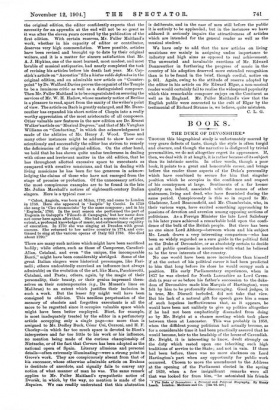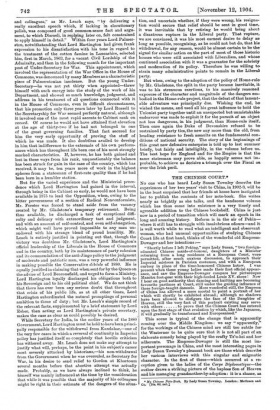BOOKS.
THE DUKE OF DEVONSHIRE.*
THOUGH this biographical study is unfortunately marred by very grave defects of taste, though the style is often turgid and obscure, and though the narrative is disfigured by trivial personalities, we do not altogether regret its appearance. If, then, we deal with it at length, it is rather because of its subject than its intrinsic merits. In other words, though a poor book, it points to a great and honourable career, and brings before the reader those aspects of the Duke's personality which have combined to secure for him that singular position which he occupies in the confidence and respect of his countrymen at large. Sentiments of a far keener quality are, indeed, associated with the names of other statesmen, living and dead, who have flourished during the same period. Conspicuously is this so in regard to Mr. Gladstone, Lord Beaconsfield, and Mr. Chamberlain, who, in their various ways, have excited something approaching to passions of devotion and aversion among opposing sections of politicians. As a Foreign Minister the late Lord Salisbury in his later years achieved a remarkable hold upon the confi- dence of the bulk of the British people. But there has been no one since Lord Althorp—between whom and his subject Mr. Leach draws a very interesting comparison—who has been so widely regarded as a sure guide in the political field as the Duke of Devonshire, or as absolutely certain to decide on all public questions in accordance with what he believed to be the true interests of the country.
No one would have been more incredulous than himself if at the outset of his political career it had been predicted to him that long before its close he would occupy such a position. His early Parliamentary experiences, when in 1857 he was elected for North Lancashire as Lord Caven- dish (a year or so before his father's succession to the duke- dom of Devonshire made him Marquis of Hartington), were felt by him to be profoundly discouraging. Good judges, it is true, Mr. Disraeli included, did not take that view. But his lack of a natural gift for speech gave him a sense of such hopeless ineffectiveness that, as it appears, he would have been not unlikely to give up politics altogether if he had not been emphatically dissuaded from doing so by Mr. Bright at a chance meeting which took place between them at Lancaster. This was probably in 1858, when the diffident young politician had actually become, as for a considerable time it bad been practically assured that he would become, heir to the headship of the house of Cavendish. Mr. Bright, it is interesting to know, dwelt strongly on the duty which rested upon one inheriting such high traditions of service to the State ; and not in vain. If there had been before, there was no more slackness on Lord Hartington's part when any opportunity for public work occurred. Chosen to move the amendment to the Address at the opening of the Parliament elected in the spring of 1859, when a few insignificant remarks were all that was looked for from him, "he astonished his friends • The Duke of Devonshire : a Personal and Political Biography. By Haw Leach. London : Methuen and Co. [Us ed. net.] and colleagues," as Mr. Leach says, " by delivering a really excellent speech which, if lacking in elocutionary polish, was composed of good common-sense fact and argu- ment, to which Dieraeli, in replying• later on, felt constrained to apply himself in detail." Within four years Lord Palmer- ston, notwithstanding that Lord Hartington had given_ frank expression to his dissatisfaction with his tone in regard to the treatment of the cotton famine in Lancashire, selected him, first in March, 1863, for a vacant Civil Lordship of the Admiralty, and then in the following month for the important post of Under-Secretary for War. This appointment, which involved the representation of the War Office in the House of Commons, was denounced by many Members as a characteristic piece of Palmerstonian insolence. But the young Under- Secretary—he was not yet thirty when appointed—threw himself with such energy into the study of the work of his Department, and showed so much knowledge, judgment, and address in his treatment of all questions connected with it in the House of Commons, even in difficult circumstances, that his promotion only three years later by Lord Russell to the Secretaryship for War seemed perfectly natural, although it involved one of the most rapid ascents to Cabinet rank on record. Of course he would not have attained that elevation at the age of thirty-two if he had not belonged to one of the great governing families. That fact secured for him the very early opportunity of proving the stuff of which he was made. It also doubtless availed to develop in him that indifference to the externals of his own perform- ances which has throughout life been one of his most strongly marked characteristics. If, however, he has both gained and lost in these ways from his rank, unquestionably the balance has been struck for gain in the case of the country, which has received, it may be, ten years more of work in the highest spheres from a statesman of first-rate quality than if he had been born in a humbler station.
But for the varied experience and the Ministerial prece- dence which Lord Hartington had gained in the interval, through being in the Cabinet so early, he would not have been available in 1875 to lead the Opposition, when, owing to the bitter perverseness of a section of Radical Nonconformists, Mr. Forster was forced to stand aside from the vacancy created by Mr. Gladstone's temporary retirement. Being thus available, he discharged a task of exceptional diffi- culty and delicacy with extraordinary tact and judgment, and with an amount of self-control, and even self-abnegation, which might well have proved impossible to any man un- endowed with his strange blend of proud humility. Mr. Leach is entirely justified in pointing out that, though the victory was doubtless Mr. Gladstone's, Lord Hartington's official leadership of the Liberals in the House of Commons and in the country, both by its maintenance of party cohesion and its commendation of the anti-Jingo policy to the judgment of moderate and patriotic men, was a very powerful influence in making possible the Conservative debciele of 1880. He is equally justified in claiming that when sent for by the Queen on the advice of Lord Beaconsfield, and urged to form a Ministry, Lord Hartington loyally discharged his obligations both to his Sovereign and to his old political chief. We do not think that there has ever been any serious doubt that throughout that crisis of his public life, as at all other times, Lord Hartington subordinated the natural promptings of personal ambition to those of duty ; but Mr. Leach's simple record of the relevant facts, supplemented by a brief statement by Lord Esher, then acting as Lord Hartington's private secretary, makes the case as clear as could possibly be desired.
While Secretary for India, in the earlier years of the 1880 Government, Lord Hartington must be held to have been princi- pally responsible for the withdrawal from Kandahar,—one of the very few cases in which a reversal of continuity in Imperial policy has justified itself so completely that hostile criticism has withered away. Mr. Leach does not make any attempt to justify what will, perhaps, be the point in his subject's career most severely attacked by historians,—his non-withdrawal from the Government when he was overruled, as Secretary for War, in his desire to send relief to Gordon at Khartoum several months before that abortive attempt was actually made. Probably, as we have always inclined to think, he himself was mainly influenced at the time by the consideration that while it was possible that the majority of his colleagues might be right in their estimate of the dangers of the situa-
tion, and uncertain whether, if they were wrong, his resigna- tion would- secure that relief should be sent • in good time, it was inevitable that by retiring he would bring about a disastrous rupture in the Liberal party. That rupture, we are convinced, it was his most earnest desire to delay as long as possible, recognising, as he could not but do, that his withdrawal, for any reason, would be almost certain to be the signal for similar action on the part of most of those historic houses who were still associated with Liberalism, and whose continued association with it was a guarantee for the sobriety and moderation of its policy. Therefore he was willing to. strain many administrative points to remain in the Liberal party.
But when, owing to the adoption of the policy of Home-rule by Mr. Gladstone, the split in the party became inevitable, it- was to his strenuous exertions, to his massively reasoned exposure of the character and magnitude of the dangers em- bodied in the Home-rule project, that the defeat of that lament- able adventure was principally due. Wishing the end, he wished the means, and used all his great influence to hold the Unionist party together until an unexpected but unmistakable endeavour was made to exploit it for the pursuit of an object not less dangerous, in his judgment, than Home-rule itself.. Then once again the Duke of Devonshire refused to be. restrained by party ties, the new any more than the old, from heading resistance to fresh assaults on the fundamental con- ditions of national security. The story of the beginnings of this great new defensive enterprise is told up to last summer briefly, but fairly and intelligibly, in the volume before us.. The best hope for England and for the Empire is that the same statesman may prove able, as happily seems not im- probable, to achieve as decisive a triumph over the Fiscal as over the Irish peril.











































 Previous page
Previous page